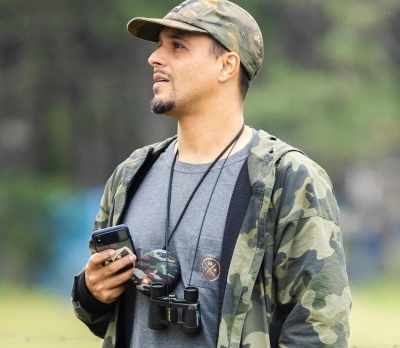"Duco" - discovering redemption in nature
The Quilombos were communities formed during the Brazilian colonial period (1500-1815) by Africans and their descendants fleeing the cruel reality of slavery. In these places, they found refuge and freedom, rebuilding their lives while preserving their cultural and religious traditions. The first Quilombo recorded in history emerged in the state of Bahia in 1575.
These slaves were brought to Brazil through the slave trade and were predominantly used in sugarcane production.
The brutality of slavery, characterised by physical abuse, exhaustive labor, and inhumane conditions, fuelled the resistance among the captives.
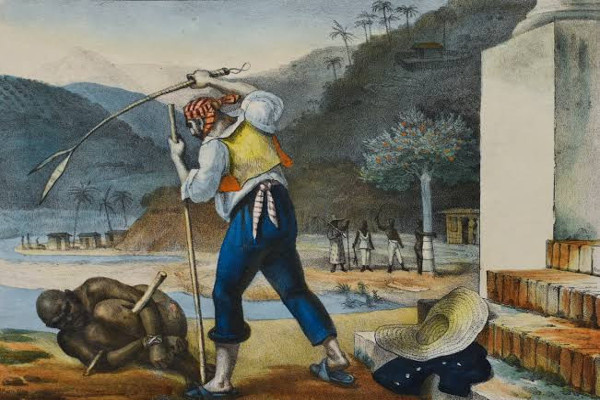
Many of these Quilombos were fortified with wooden walls and traps around them, aiming to ensure the safety of the communities that settled there.
A few Quilombos resisted attacks from the Portuguese colonial authorities but many others didn’t.
Subsistence in the Quilombos was ensured by subsistence agriculture, with emphasis on cassava flour production, as well as corn, beans, sweet potatoes, pumpkin, sugarcane, and other crops. Fruits, roots, hunting, and fishing also supplemented the Quilombolas' diet.
Although Quilombos continue to exist in the 21st century, their nature has changed. Today, Quilombos are communities formed by descendants of the Quilombolas slaves, seeking to preserve their cultural traditions while fighting for the legal recognition of their lands and striving to develop a sustainable way of life.
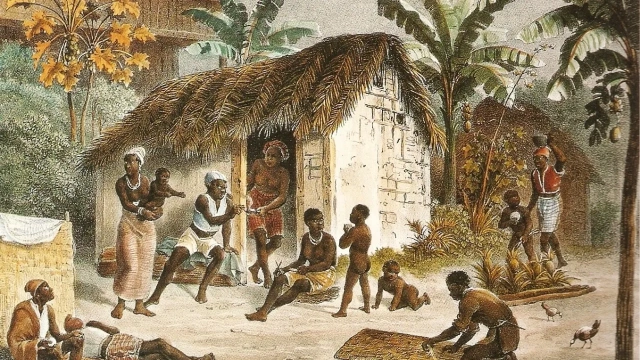
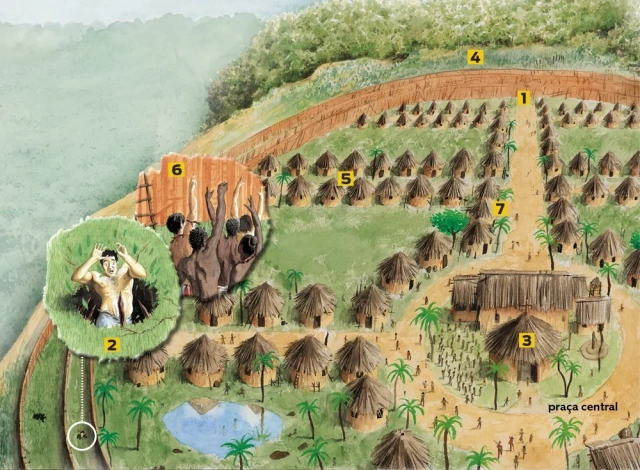
Eldorado, located in São Paulo, serves as the backdrop for Carlos's story. Rich in natural resources such as winding rivers, stunning waterfalls, and mysterious caves, Eldorado is situated in the Atlantic Forest, one of the most biodiverse forests in the world, harbouring a vast range of species, including almost 1,000 bird species, of which 311 have been recorded only in Eldorado.
For Carlos, affectionately known as Duco, his journey took him from palm heart extractor/hunter to tour guide. His dedication to studying and protecting the region's birds distinguished him as a community leader.
The encounter with the majestic Ornate Hawk-eagle during the mating ritual marked a turning point in his life, encouraging him to dedicate himself even more to conservation.
Despite facing challenges and struggles along the way, Duco discovered redemption in his mission to preserve nature and share the tales of his ancestors, along with rare bird sightings, inspiring his community and others to follow his example.
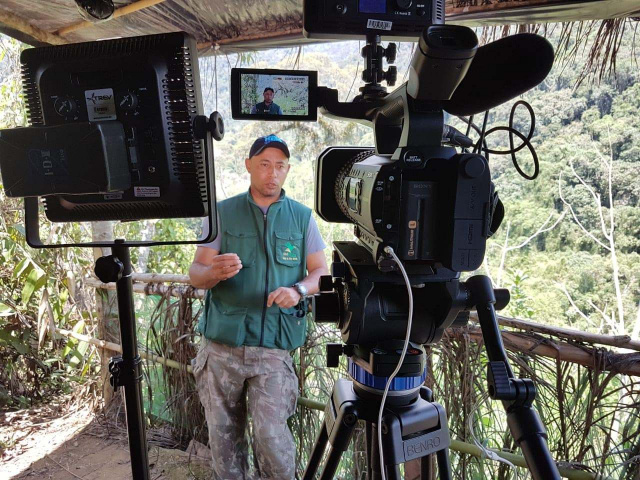

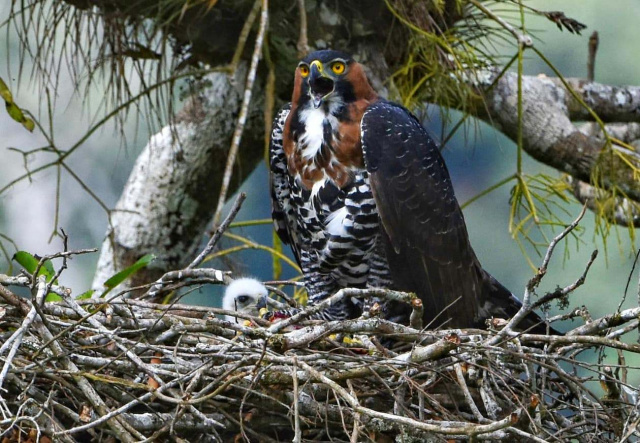
You can learn more about and follow Duco's work through his instagram page or Facebook page
A wonderful documentary about Duco's life and work from filmmakers BIRDCHECK BRASIL was produced in 2022, and you can view below.
Some of the birdlife of the Atlantic forest can be explored here
A gallery of images from parts of Duco's life can be explored here
The Quilombos were communities formed during the Brazilian colonial period (1500-1815) by Africans and their descendants fleeing the cruel reality of slavery. In these places, they found refuge and freedom, rebuilding their lives while preserving their cultural and religious traditions. The first Quilombo recorded in history emerged in the state of Bahia in 1575.
These slaves were brought to Brazil through the slave trade and were predominantly used in sugarcane production.
The brutality of slavery, characterised by physical abuse, exhaustive labor, and inhumane conditions, fuelled the resistance among the captives.

Many of these Quilombos were fortified with wooden walls and traps around them, aiming to ensure the safety of the communities that settled there.
A few Quilombos resisted attacks from the Portuguese colonial authorities but many others didn’t.
Subsistence in the Quilombos was ensured by subsistence agriculture, with emphasis on cassava flour production, as well as corn, beans, sweet potatoes, pumpkin, sugarcane, and other crops. Fruits, roots, hunting, and fishing also supplemented the Quilombolas' diet.
Although Quilombos continue to exist in the 21st century, their nature has changed. Today, Quilombos are communities formed by descendants of the Quilombolas slaves, seeking to preserve their cultural traditions while fighting for the legal recognition of their lands and striving to develop a sustainable way of life.


Eldorado, located in São Paulo, serves as the backdrop for Carlos's story. Rich in natural resources such as winding rivers, stunning waterfalls, and mysterious caves, Eldorado is situated in the Atlantic Forest, one of the most biodiverse forests in the world, harbouring a vast range of species, including almost 1,000 bird species, of which 311 have been recorded only in Eldorado.
For Carlos, affectionately known as Duco, his journey took him from palm heart extractor/hunter to tour guide. His dedication to studying and protecting the region's birds distinguished him as a community leader.
The encounter with the majestic Ornate Hawk-eagle during the mating ritual marked a turning point in his life, encouraging him to dedicate himself even more to conservation.
Despite facing challenges and struggles along the way, Duco discovered redemption in his mission to preserve nature and share the tales of his ancestors, along with rare bird sightings, inspiring his community and others to follow his example.



You can learn more about and follow Duco's work through his instagram page or Facebook page
A wonderful documentary about Duco's life and work from filmmakers BIRDCHECK BRASIL was produced in 2022, and you can view below.
Some of the birdlife of the Atlantic forest can be explored here
A gallery of images from parts of Duco's life can be explored here
You might like...
Duco - redemption in nature
Imagery from the life of Duco, a Brazilian environmentalist, nature and bird-guide who found redemption in nature
Birds of the Atlantic Forest
The Atlantic Forest is one of the most biodiverse forests in the world including almost 1000 bird species. Here are a few of these birds from photographer Marcio Conrado.
Amazon Basin
The Amazon River basin encompasses the largest rainforest ecosystem and up to 30% of all of the species of plants and animals on planet Earth

Marina Silva - champion of the Amazon
Newsletter
Sign up to keep in touch with articles, updates, events or news from Kuno, your platform for nature

